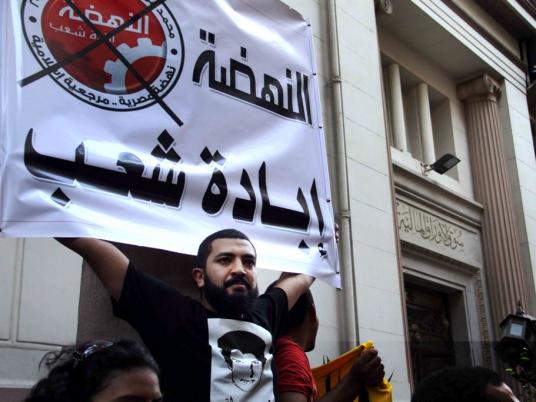
Leftist leaders have spoken out against a US$4.8 billion loan from the International Monetary Fund in past weeks. But with negotiations already underway between President Mohamed Morsy’s government and the IMF, their rhetoric is largely falling on deaf ears.
Without any representation in Morsy’s new team of advisers or the Cabinet, and with a dissolved Parliament, leftist leaders have no political inroads. In addition, they have released few plausible or detailed alternatives to the loan besides raising taxes, and have failed to spark any substantial popular resistance to its potential economic effects.
Their window of influence is also closing fast. The further negotiations continue with the IMF, which is sending another delegation to Cairo at the end of September, the more difficult it will be for the government to backtrack.
Leftists' most common criticism is that the IMF loan demonstrates the new government’s loyalty to the free-market privatization economy of former President Hosni Mubarak.
"This government's economic policies are similar to the ones used by ousted President Mubarak," said Tarek Saied, member of the Karama Party's executive bureau.
"It depends on foreign aid and foreign loans, rather than rebuilding the public sector," said Saied, whose party identifies as Nasserist.
Last Friday, leftist parties held a small protest against government policies, including the IMF loan. Two days earlier, dozens of protesters marched with members of the Revolutionary Socialists and the Campaign to Drop Egypt’s Debt through downtown Cairo to the cabinet condemning the loans.
Those involved in the march handed out fliers to bystanders detailing the percent amounts of Egypt’s debt payments in its budget, but educating citizens about complicated debt issues proved difficult. Many participants’ reasons for marching were more nationalist than economic.
“We believe in building a strong economy based on our own resources without depending on any foreign aid or loans … that's the real way out for Egypt," Nagwa Abbas, founding member of the Socialist Popular Alliance Party, told Egypt Independent.
The Tagammu, Socialist Popular Alliance and Egyptian Communist parties have set forward alternatives to the loan. On 29 August, they issued a joint statement laying out measures they believe could replace the loan. Among them were: strict and progressive taxation, exceptional one-time taxes on the "rich," new tax profits achieved through stock trading and real-estate, and annulling unjustifiable taxation breaks.
The rhetoric from the left also remains focused on how to best redistribute Egypt’s wealth. But the Robin Hood-like plans are lacking in detail.
"Things need to change in favor of the majority of Egypt's population that lives under the poverty line, after the revolt that called for social justice," said Karima al-Hifnawy, secretary general of the Egyptian Socialist Party.
Hifnawy has suggested setting a reasonable maximum wage and retrieving "the state's money that was smuggled abroad by former corrupt officials during the revolt" as an alternative to the IMF loan.
The government has worked to retrieve the money held in foreign accounts by Mubarak regime officials for over a year, but with little result.
The lack of transparency surrounding the conditions on the loan has also led some leftists to guess at them, sometimes incorrectly.
On 28 August, former presidential candidate and rights activist Khaled Ali filed lawsuits against Morsy, Prime Minister Hesham Qandil and Finance Minister Momtaz al- Saeed, demanding that the government disclose all details and conditions related to the IMF loan. Ali claimed that the conditions included further devaluation of the Egyptian pound, which has already plummeted "4 percent ever since 2011."
Morsy and Saeed said there was no such devaluation on the horizon, and economists largely agree that the IMF would not be looking to devalue the pound in the short term. In fact, one of the loan’s purposes would be to keep the value of the pound stable in the coming months.
Other economic experts say the loan is a political Band-Aid.
Ahmed al-Naggar, an economic expert at Al-Ahram Center for Political and Strategic Studies, said on his Facebook page that the loan will temporarily boost Morsy and his government's image regarding the economy. Morsy's government would pay off 42 percent of the debt, according to Naggar, leaving any new government with the rest.
Ola El-Khawaga, a professor of economics at Cairo University, said while the left has raised good suggestions, their ideas are not new and will require drastic political will, over which liberal leaders currently have little influence.
She said in the short term, the loan remains a necessity.
"Most of these suggestions need to be implemented in any case and we've been calling for them, but they can't substitute for the IMF loan," Khawaga said.



